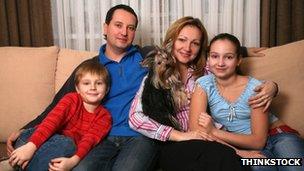Families to be 拢1,800 a year worse off by 2015, IFS says
- Published

Middle-income families will see their spending power cut by 拢34 a week
The average middle-income family in Britain is likely to be nearly 拢1,800 a year worse-off by 2015, according to the Institute for Fiscal Studies (IFS).
Families with two children will see a fall of 拢34 in their weekly incomes, after adjusting for inflation.
A childless couple is likely to lose 拢1,248 a year, or 拢24 a week.
The IFS also said that over the next three years, less well-off families will be hit harder than those with higher incomes.
The cuts in spending power are because incomes are failing to keep pace with inflation, and because of changes to the benefits system.
Pain ahead
The study suggests that better-off families suffered disproportionately in the years following the recession.
Those who earn more than 拢48,000 after tax saw their incomes fall by 6.3% between 2007-08 and 2011-12.
However, people on lower incomes are likely to be hardest-hit between now and 2016.
Those earning less than 拢12,000 a year will see their spending power fall by 4.5% between 2011-12 and 2015-16.
"Most of the falls in real incomes associated with the recession have now happened for middle- and higher-income groups," said Robert Joyce, a senior economist at the IFS.
"But much of the pain for lower-income groups is occurring now, or is still to come," he said.
The main reason for that, said the IFS, was the changes to benefits which are in the process of being introduced to help cut the government deficit.
Among them are the benefits cap, changes to housing benefit, the localising of council tax benefit, and the end of disability living allowance.
As a result, the IFS says that although income inequality fell in the years after the recession, it is now on the rise again.
Wealth divide
Such income inequality is mirrored by a disparity in wealth levels, according to a separate report out today from the Office for National Statistics (ONS).
The study shows that 28% of adults aged 45 to 64 living in south-east England live in households with wealth greater than 拢1m. The figure includes the value of property.
By contrast, in north-west England, the proportion of people with such wealth is only 14%.
The differing fortunes of pensioners are also highlighted in the ONS report.
In the North East, 24% of pensioners live in households with wealth of less than 拢50,000. In the South West it is 9% of pensioners.